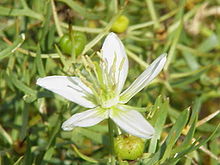Peganum harmala
| Peganum harmala | |
|---|---|

| |
| Harmal (Peganum harmala) flower | |
| Scientific classification | |
| Kingdom: | Plantae |
| Clade: | Tracheophytes |
| Clade: | Angiosperms |
| Clade: | Eudicots |
| Clade: | Rosids |
| Order: | Sapindales |
| Family: | Nitrariaceae |
| Genus: | Peganum |
| Species: | P. harmala
|
| Binomial name | |
| Peganum harmala | |
| Synonyms | |
| |
Peganum harmala, commonly called wild rue,[1] Syrian rue,[1] African rue,[1] esfand or espand,[6] or harmel,[1] (among other similar pronunciations and spellings) is a perennial, herbaceous plant, with a woody underground root-stock, of the family Nitrariaceae, usually growing in saline soils in temperate desert and Mediterranean regions. Its common English-language name came about because of a resemblance to rue (to which it is not related). Because eating it can cause livestock to sicken or die, it is considered a noxious weed in a number of countries. It has become an invasive species in some regions of the western United States. The plant is popular in Middle Eastern and north African folk medicine. The alkaloids contained in the plant, including the seeds, are monoamine oxidase inhibitors (Harmine, Harmaline).[7]
Etymology[]
African rue is often used in North American English.[1][8][9][10][11]
Harmel is used in India,[1] Algeria,[12] and Morocco.
It is known in as اسپند in Persian, which is transliterated as espand,[6] or ispand[13] but may also be pronounced or transliterated as sepand, sipand, sifand, esfand, isfand, aspand, or esphand depending on source or dialect.[14][15] The Persian word اسپند is also the name of the last month of the year, approximately March, in the traditional Persian calendar.[16][17] It is derived from Middle Persian spand, which is thought, along with the English word spinach, to be ultimately derived from Proto-Iranian *spanta-, 'holy' (compare Avestan